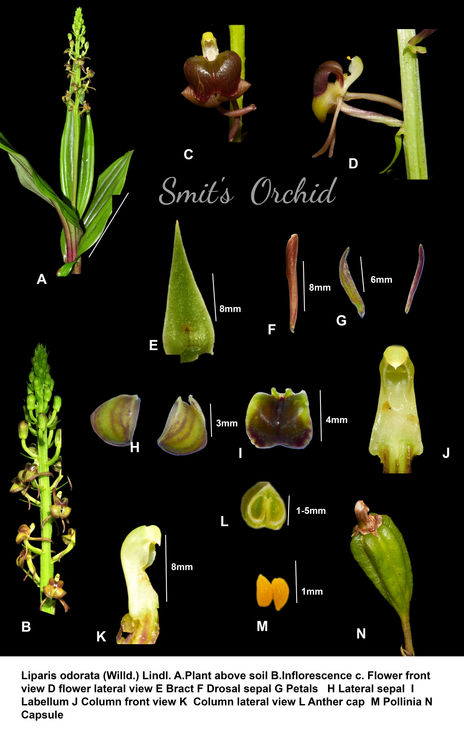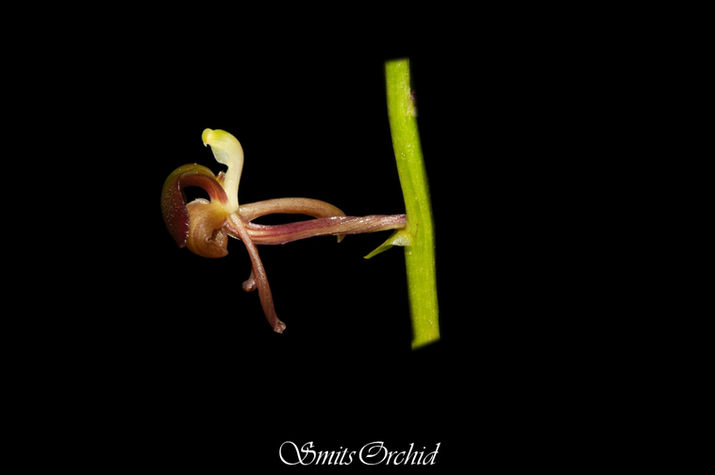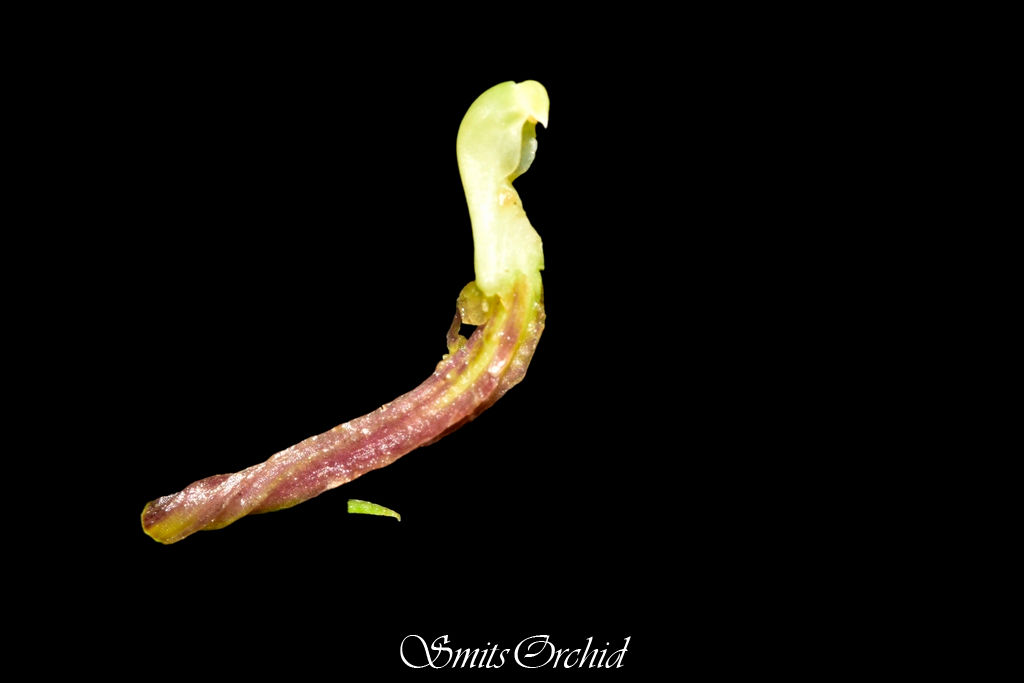
Liparis
Sub Family Epidendroideae
Tribe Malaxideae
-
Derivation of name from Greek Liparos, shiny, grasy in allusion to shiny leaves Perennial, epiphytic or terrestrial herbs.
-
Stems ± creeping, branches pseudobulbous and short and thick, or long and narrow, sheathed.
-
Leaves one or more, from the top of pseudobulb or stem, sheathing, ± plicate.
-
Inflorescence Scape terminal, terete or angled and winged. Racemes dense or lax.
-
Sepals and petals erect or reflexed; sepals mostly oblong-lanceolate, free, spreading; petals narrowly linear to filiform, very rarely broader.
-
Labellum clawed, ± parallel to column, narrow; limb . broad,entire or bifid; calli .absent, or if present 1 or 2, conic, at base of lip.
-
Column footless, rather long, curved, with narrow lateral wings above, rarely short.
-
Anther ovate, 2-celled, terminal, incumbent, opercular; pollinia 4, waxy, ovoid, united in pairs at their apices.
-
Capsules ellipsoid or pyriform, erect or subpendulous.

Liparis odorata (Willd.) Limdl.
In Gen. Sp. Orchid. Pl.: 26 (1830)
-
Empusa odorata (Willd.) T.C.Hsu in Ill. Fl. Taiwan 2: 19 (2016)
-
Leptorkis odorata (Willd.) Kuntze in Revis. Gen. Pl. 2: 671 (1891)
-
Malaxis odorata Willd. in Sp. Pl., ed. 4. 4: 91 (1805)
-
Empusa paradoxa Lindl. in Bot. Reg. 10: t. 825 (1824)
-
Leptorkis parishii (Hook.f.) Kuntze in Revis. Gen. Pl. 2: 671 (1891)
-
Liparis guamensis Ames in Philipp. J. Sci., C 9: 11 (1914)
-
Liparis longiscapa (Rolfe & Downie) Gagnep. in H.Lecomte, Fl. Indo-Chine 6: 182 (1932)
-
Liparis odorata var. longiscapa Rolfe & Downie in Bull. Misc. Inform. Kew 1925: 370 (1925)
-
Liparis paradoxa (Lindl.) Rchb.f. in W.G.Walpers, Ann. Bot. Syst. 6: 218 (1861)
-
Liparis paradoxa var. parishii Hook.f. in Fl. Brit. India 5: 698 (1890)
-
Liparis parishii (Hook.f.) Hook.f. in Fl. Brit. India 6: 182 (1890)
-
Liparis simeonis Schltr. in Repert. Spec. Nov. Regni Veg. 20: 383 (1924)
-
Liparis teniana Kraenzl. in Repert. Spec. Nov. Regni Veg. 17: 112 (1921)
-
Liparis tenii Schltr. in Repert. Spec. Nov. Regni Veg. 17: 66 (1921)
-
Liparis tonkinensis Gagnep. in Bull. Soc. Bot. France 79: 167 (1932)
-
Malaxis lancifolia Sm. in A.Rees, Cycl. 22: n.° 7 (1812)

Ecology: terrestrial herb, growing on moist laterite soil in shade often near stream in ever green as well as semi ever green forest
Pseudobulbs subovoid, 1.3-2.2 × 1-1.5 cm, noded, ± enclosed by white membranous sheaths.
Leaves 2 or 3; petiole 2.5-10 cm, sheathlike, not articulate; blade narrowly elliptic, ovate-oblong, oblong-lanceolate, or linear-lanceolate, 6-17 × 2.5-6 cm, membranous or herbaceous, base contracted into petiole, margin entire, apex acuminate.

Inflorescence 14-40 cm, conspicuously exceeding leaves; Peduncle quadrangular green laxly several to 10-flowered
Bracts 4-6X3-5 mm often spreading horizontally, lanceolate.

Flowers resupinate, greenish yellow or greenish brownish; pedicel and ovary 6-8 mm.

Sepals unequal spreading, dorsal sepal 7-8 × 1.5 mm linear, inconspicuously 3-veined, margin revolute, apex obtuse; lateral sepals 6-7 × 2.5 mm, ovate-oblong, slightly oblique, 3(or 4)-veined.

Petals 6-7 × 0.8 mm nearly narrowly linear, widened toward apex, 1-veined, margin revolute;

Labellum obovate-oblong, 5.5 × 3.5-4.5 mm, with 2 triangular calli near base, apical margin denticulate, apex subtruncate and emarginate; calli ± united at base,0.8 mm tall. Column slightly arcuate, ca. 4.5 mm, with narrow wings on both sides, wings gradually widened toward column apex.

Capsule 1-2cm, obovoid-oblong or ellipsoid.
Flowering June – July
Fruiting October




















